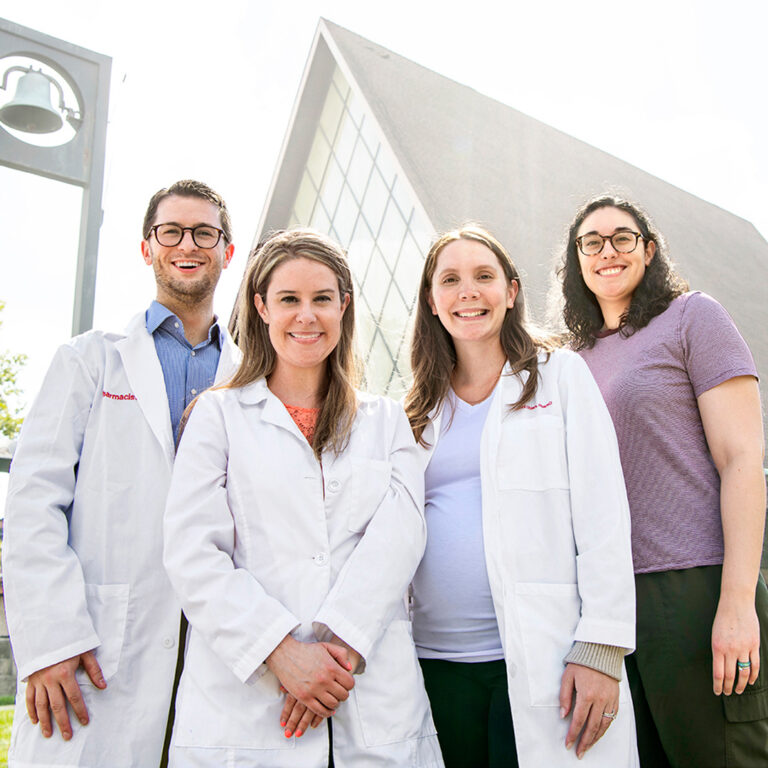2022 Winners

Praise from customers
“They are a blessing to our community. They help the low income and underprivileged get medications so they stay healthy. They also check blood pressure and weight and can address other problems you may have or need help with.”
“They are the most caring pharmacy, and I think they deserve to be recognized for the good work that they do—for free. They go above and beyond to make sure I stay healthy.”
“When they were on lockdown because of COVID, they sent my meds to me and called to make sure I received them. I thank them for going above and beyond to make sure I stay healthy.”
The team at Charitable Pharmacy of Central Ohio has been named the 2022 Best Independent Pharmacy because of their impassioned and comprehensive service to the underserved people of Franklin County, Ohio.
Patients, who fall 200% below the federal poverty level, are referred to the pharmacy by case managers working in hospitals and doctors’ offices. True to its name, Charitable Pharmacy—which has two locations throughout Columbus, Ohio—provides services and medications to patients, even those with insurance, at little or no charge.
The staff of Charitable Pharmacy includes executive director R. Taylor Reed, Pharm.D., pharmacy manager Ronni D’Agostino, Pharm.D., clinical pharmacist Holly Fahey, Pharm.D., lead pharmacy technician Carlyn Caldwell, CPhT, and patient services manager Beth Collier, LSW, CPhT. Each is committed to providing services and meds to the people in their area who need it the most.
While Charitable does buy some of its medication the same way traditional pharmacies do, as a nonprofit, they also tap into partnerships with charitable drug wholesalers and repurpose unused drugs from hospitals and long-term care facilities.
But the people behind Charitable Pharmacy understand that medication is just one tool in the healthcare toolbox. At each visit, patients can sit down with a pharmacy staff member who looks over their medication, provides health screenings and education, answers questions, and points them in the direction of social services, such as food or housing assistance, as needed.
Here, we asked Caldwell and Drs. Reed, D’Agostino, and Fahey to describe their local pharmacy and what drives them to provide for the community.
Tell us about the community you serve.
R. Taylor Reed, Pharm.D. (pharmacist and executive director): Our average patient takes eight medications and is managing five chronic diseases. As much as 40% of people living in our community are vulnerable. Many have insurance and are working one or more jobs, yet face tough decisions when needing to afford medicines and health care. Having poor health can get in the way of advancing in careers or education.
How did Charitable Pharmacy get its start?
Dr. Reed: Before the Affordable Care Act, there was a crisis of people using hospitals and emergency rooms because they couldn’t afford to go to a primary care doctor. Or, sadly, they would get to the pharmacy counter and not be able to afford their medicine—and that led to people not taking their medications.
Think of prescriptions as tools to solve problems: If you leave the tool behind, you’re not really solving the problem. That creates a vicious and expensive cycle for both the healthcare system and the person who’s already vulnerable and struggling.
Healthcare leaders, the faith community, local government leaders, and business owners in our area came together and said, “How do we solve this crisis locally?” We opened in February of 2010. We got referrals from the prison system for those who were being released. We got referrals from people coming out of emergency rooms, who were being discharged and didn’t know where to go. We got referrals from case managers at hospitals and doctor’s offices.
How do you serve your patients?
Dr. Reed: I think in each patient, we can see ourselves or a family member. The people we serve are everyday people. Whether we grapple with the same disease they have or a loved one does, it’s easy to put ourselves in their shoes because the desire for our patients and our team members is to have better health and to overall feel safer and more secure.
I think in each patient, we can see ourselves or a family member. The people we serve are everyday people.
We all want better lives for ourselves and our families and to remove the burden that is disease. We all share wanting a better, more full life.
We go that extra mile for our patients so we can provide medicine at low or no cost. We don’t just suggest a lower-priced drug. We ask a deeper question: What’s affordable? What options are truly accessible to you? We want to empower our patients and give them dignity.
Tell us a little more about your patient counseling.
Holly Fahey, Pharm.D. (clinical pharmacist): We have a couple of different ways to counsel. Before COVID, it was all in person, inside the pharmacy. We would bring patients to a private counseling room and typically spend about 20 minutes with each patient to review their medications. When COVID hit, we converted to a curbside model and also counseled over the phone. Now, we’re hybrid.
Ronni D’Agostino, Pharm.D. (pharmacy manager): The pharmacy still offers curbside service and phone counseling to patients who’d rather not risk any exposures. If a customer doesn’t have a phone, the staff can counsel inside the pharmacy or outside in the parking lot.
Dr. Fahey: Whichever way a patient chooses, we go through each medication to make sure the patient knows how they should work and why they’re taking it. We also counsel them on adverse effects and what to keep an eye out for, because we wouldn’t want their meds to do more harm than good.
How else has COVID impacted your pharmacy?
Dr. D’Agostino: We’ve been very thoughtful in how we’ve proceeded during COVID because our population is very vulnerable based on their socioeconomic status and their access to health care and things like personal protective equipment. The staff was split up into two teams at the height of COVID, so that if one team member exposed someone to COVID while working with them, the other team could step in and keep the pharmacy open.
What’s your team dynamic like?
Dr. D’Agostino: We’re like a family. We’re all here working for the same mission. And if there’s a problem, we work on a solution together. It’s not an individual thing. We want to help our neighbors get access to medication, which we all truly believe is a fundamental human right. Doing this kind of work involves having the right people at the table.
Carlyn Caldwell (lead pharmacy technician): This is a calling for me. I’ll be leaving work some days and I’ll think, wow, we did this. We saved someone’s life. We gave them access to medication.
We’re like a family. We’re all here working for the same mission.
Why do you think your customers said your team goes above and beyond?
Dr. Reed: I think because they see us helping them with what they thought was an unsolvable problem. We found a way to make affordable or free what was previously out of reach.
Caldwell: We really try to give our patients resources to things like food pantries and doctors and housing that are low cost. We try to help them with anything they need. We guide them and give them directions on where to go.
Dr. Fahey: Every day, we have patients come in here. And you can just tell that they’re overwhelmed. They’re tired. And then, after they leave here with their meds, you can just see how relieved they are. They have a team that can care for them consistently.
Praise from customers
“They are a blessing to our community. They help the low income and underprivileged get medications so they stay healthy. They also check blood pressure and weight and can address other problems you may have or need help with.”
“They are the most caring pharmacy, and I think they deserve to be recognized for the good work that they do—for free. They go above and beyond to make sure I stay healthy.”
“When they were on lockdown because of COVID, they sent my meds to me and called to make sure I received them. I thank them for going above and beyond to make sure I stay healthy.”

